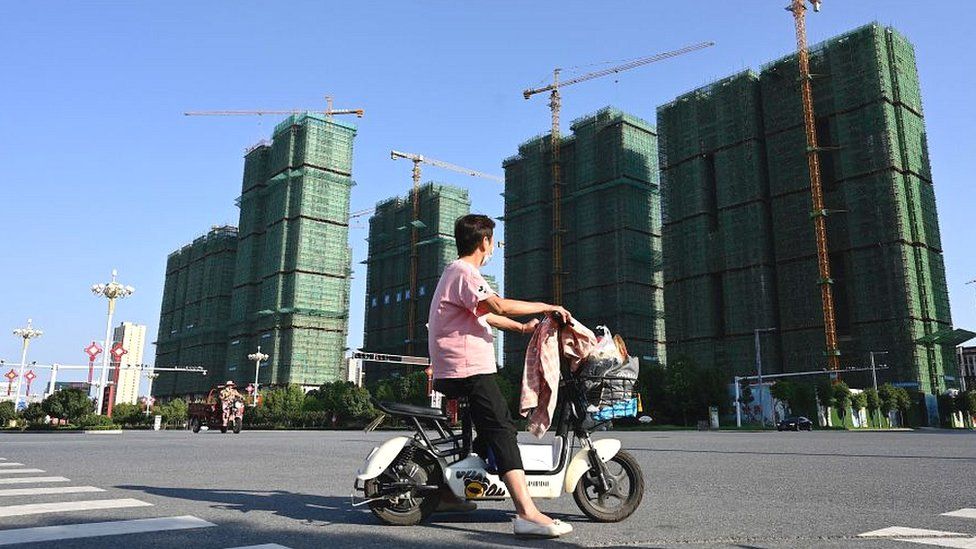Evergrande, China’s Real Estate Giant, Seeks US Bankruptcy Protection; Is China’s housing bubble Set To Burst?
Evergrande, China's colossal real estate titan, once revered for its scale and ambition, now stands as a striking symbol of the challenges afflicting China's property market. The company's decision to file for bankruptcy protection under Chapter 15 of the US bankruptcy code has sent ripples across financial markets and raised pertinent questions about the broader implications for China's economy and beyond. China's housing bubble, in contrast to what official data portray, is causing far more extensive harm. According to China's official statistics, the housing market appears resilient despite sluggish economic growth and record developer defaults.

China’s massive real estate player, Evergrande, has officially filed for bankruptcy under Chapter 15 of the US bankruptcy code. This specific chapter is designed to safeguard international companies undergoing restructurings from potential lawsuits by creditors seeking to seize assets within the United States.
Known as the world’s most debt-laden property developer and emblematic of China’s property turmoil, Evergrande has taken this step to shield itself from creditors in a US bankruptcy court. Its affiliate, Tianji Holdings, also sought similar protection under Chapter 15 in a Manhattan bankruptcy court.

The timing of Evergrande’s bankruptcy application coincides with mounting concerns that the challenges faced by China’s property sector could ripple into other aspects of the nation’s economy amidst a decelerating growth rate.
Since the initiation of the real estate debt crisis in mid-2021, nearly 40% of Chinese housing sales corporations have defaulted, fuelling apprehensions that China’s property slump could extend into the surrounding region.
Wall Street banks have cautioned that China’s real estate weakness could exert a prolonged drag on the economy, impacting not just the nation itself but potentially affecting neighbouring countries as well.
Goldman Sachs economists have noted an anticipated “L-shaped recovery” in the property market, characterized by steep declines followed by a gradual recuperation.
“We see persistent weaknesses in the property sector, mainly related to lower-tier cities and private developer financing, and believe there appears no quick fix for them,” Goldman Sachs economists led by China economist Lisheng Wang said in a weekend note.
“Based on our estimates, the property weakness will likely be a multi-year growth drag for China, but it could be less painful in 2023 than in 2022.”
Data from May highlights that China’s property sector is struggling to rebound, despite glimpses of revival seen earlier this year. Market observers predict that China might employ fiscal stimulus policies to support the real estate sector, aiming to bolster the economy as it strives to regain momentum post-Covid-19.
Recent cuts by the People’s Bank of China to the seven-day reverse repurchase rate sparked a surge in Chinese property stocks listed on the Hong Kong stock exchange.
“Based on our estimates, the property weakness will likely be a multi-year growth drag for China, but it could be less painful in 2023 than in 2022.”
These cuts are the first of their kind since August, raising optimism about potential further stimulus and policy adjustments.
Goldman Sachs economists predict that the Chinese government might introduce additional housing stimulus packages to prop up the property sector.
The divergence between public and private
Contrasting conditions between state-owned and private property businesses have emerged as a concern.
Analysts have warned that a substantial gap between these two sectors might exacerbate risks within the financial system, potentially causing a deeper economic slowdown in China.
Despite efforts by the Chinese government to regulate property prices, experts believe that this could limit the number of potential buyers, hindering a robust market recovery.
Morgan Stanley’s mid-year outlook report underscores that continued weaknesses in the property sector could lead to more challenges for China’s growth trajectory.
If the challenges in the property sector deepen and bring risk aversion in the financial system and affect consumer confidence, this will cause a deeper slowdown in China,” Morgan Stanley’s chief economist Chetan Ahya wrote.
The report also indicates that if monetary easing measures fail to resuscitate the struggling sector, concerns of spillover effects across the Asia-Pacific region might arise.
The health of Country Garden, the largest privately-run property developer in China, has prompted concerns after the company missed interest payments.
Evergrande, which has now filed for bankruptcy carried a staggering $330 billion in liabilities, had a late 2021 default that triggered a series of defaults across other developers, leaving thousands of unfinished homes across China.
Evergrande’s recent financial woes have led to a combined loss of $81 billion for 2021 and 2022. Amid these losses, the company’s electric-vehicle unit, China Evergrande New Energy Vehicle Group, proposed its own restructuring plan. This plan involves a $2.7 billion debt-for-equity swap and a nearly $500 million share sale, potentially granting NWTN, an automaker based in Dubai, a 27.5% stake.
The trading of China Evergrande shares has been suspended since March 2022.

China’s Housing Bubble
China’s housing bubble, in contrast to what official data portray, is causing far more extensive harm. According to China’s official statistics, the housing market appears resilient despite sluggish economic growth and record developer defaults.
Government figures indicate a mere 2.4% drop in new-home prices from their peak in August 2021 and a 6% decline in existing home prices. Yet, insights from property agents and private data sources paint a much grimmer picture.
These alternative figures reveal existing-home prices plummeting by at least 15% in prime city areas like Shanghai and Shenzhen, as well as in over half of tier-2 and tier-3 cities. Homes near Alibaba Group Holding Ltd.’s headquarters in Hangzhou have suffered a staggering 25% drop from late 2021 highs, according to local agents.
While making direct comparisons is complex, experts and economists contend that China’s official home-price indicators likely underestimate the depth of the downturn. This discrepancy partly arises due to longstanding methodologies that struggle to capture market turning points.
This has raised concerns among investors about the accuracy of economic data in China, where information accessibility has become increasingly restricted under President Xi Jinping’s administration.

There’s also uncertainty about whether policymakers truly grasp the market dynamics as they formulate strategies to boost demand. Furthermore, potential homebuyers might remain cautious, waiting for price declines to manifest in official data before making a move.
Unlike other countries where home-price data is based on comprehensive market transactions, China relies on selective samples, contributing to the disconnect between official and private sources. This has implications for market perception and policy decisions.
China’s National Bureau of Statistics (NBS) uses a Laspeyres price index, a widely used formula globally, to calculate its 70-city home-price index. However, experts contend that the methodology and index calculations lack transparency.
This gap between official and private data results in inconsistencies with market sentiments, as revealed by a report from Goldman Sachs Group Inc. Economists also point out that China’s non-disclosure of home prices post-transaction settlement adds to the complexity.
Home prices have dropped by significant margins in cities like Hangzhou and Shanghai, where Alibaba and financial districts are located. Even tier-2 and tier-3 cities have experienced substantial declines, exacerbating the challenge of obtaining stable data for tracking home prices.
China’s unique policy levers, such as restricting property purchases based on birthplace or property ownership limits, further complicate market dynamics. The government’s direct intervention in pricing through regulatory ceilings and pre-sales permits distorts the market additionally.
The Last Bit, the reliability of housing price statistics in China is questionable, hindering effective policy formulation and market stabilization efforts. As the situation worsens, experts believe that stronger measures may be necessary to reverse the downward spiral.







